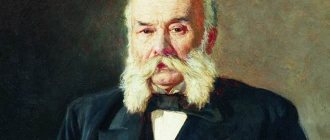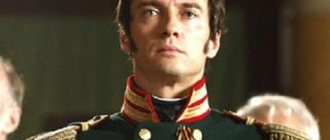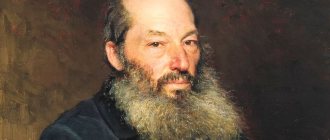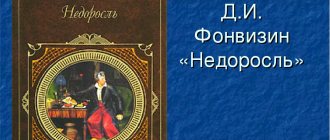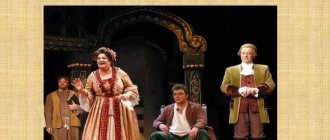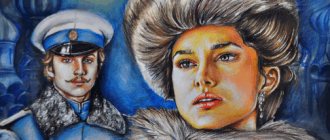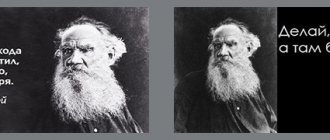Portrait: description of appearance, speech
In the novel “War and Peace,” Mikhail Illarionovich Kutuzov is shown already in his old age, gray-haired, stooped, and obese. He was wounded near Ishmael, and from this wound a scar remained on his temple, and one of his eyes leaked out. Kutuzov had an aquiline nose, and his face and neck were plump. Tolstoy notes that his gaze was now mocking, now affectionate, now concerned. Kutuzov's voice is not loud, but when necessary, Mikhail Illarionovich spoke loudly. His speech was simple, unhurried, clear, sometimes he used affectionate words (“darling”, “darling”, etc.). Kutuzov’s gait was confident and heavy, and his gestures and facial expressions were expressive.
Kutuzov did not say famous words about leaving Moscow
Kutuzov is credited with a phrase that he allegedly said at the military council in Fili before the surrender of Moscow to Napoleon: “With the loss of Moscow, Russia is not lost, but when the army is lost, then the loss Yana and Moscow and Russia.” In fact, Kutuzov all the time asserted exactly the opposite. On August 17 (30), 1812, in a letter to the Moscow mayor Pactopchin, he assured that in no case would he surrender Moscow, adding: “In my opinion, the loss of Moscow will not The loss of Russia is closely connected.” The Battle of Borodino, after which the Russian army was forced to continue its retreat, convinced Kutuzov of the inevitability of abandoning Moscow. He convened the Council in Fili on September 1 (13) with a decision made in advance. In order not to voice the fatal words himself, he left the advice to General Barclay de Tolly to open. Barclay said: “Having saved Moscow, Russia is not saved from a cruel, wasteful war; but having saved the army, the hopes of the Fatherland are not yet destroyed.” Kutuzov, without speaking on the essence of the issue, drew a line at the debate at the council, without unnecessary introductions or summary, ordering the troops to be given the disposition to retreat.
Character. Behavior
Kutuzov in Tolstoy's novel is a wise man, modest, and does not boast of his merits. He was kind and affectionate with people he liked. For example, Mikhail Illarionovich warmly treated the son of his old comrade, Prince Nikolai Andreevich Bolkonsky, an intelligent and energetic adjutant, Prince Andrei.
Kutuzov had a calm character; he did not like to rush. Unlike Napoleon, he did not make pretentious speeches. In general, Mikhail Illarionovich seemed like an ordinary person: he spoke simply, sometimes joked, wrote letters to his daughters, read novels, loved to communicate with beautiful women. Sometimes he was out of sorts. So, during preparations for the battle of Austerlitz, which the emperor insisted on, contrary to the opinion of Kutuzov, Mikhail Illarionovich irritably reprimanded the general for the fact that his battalions were not marching in formation around the village.
Fear of telling the truth to monarchs
Kutuzov was always obsequious to those in power and did not say anything unpleasant to them, even when the situation required it. During the war of 1805, Kutuzov was an opponent of the battle with Napoleon at Austerlitz, but did not dare to express his concerns directly to the tsar. Instead, he... turned to the chamberlain of the court, Count Nikolai Tolstoy, with a request to influence Alexander I: “Persuade the sovereign not to give battle. We will lose it." To which the purely civilian courtier quite reasonably objected: “My concern is sauces and roasts. War is your business.” Before the start of the fatal battle, the tsar inquired from Kutuzov why he did not command the start of the attack. Kutuzov said that he was waiting until all the troops arrived. Alexander, who knew only parades from all military affairs, remarked irritably: “We are not in Tsaritsyn’s Meadow, where parades do not begin until all the regiments arrive.” Kutuzov replied: “That’s why I don’t begin, because we are not in Tsaritsyn’s meadow!” Contemporaries (contrary to how Leo Tolstoy conveyed this episode in “War and Peace”) agree that Kutuzov added: “However, if Your Majesty orders...” According to evidence Well, the order was given, and it was not specified by whom. There is reason to believe that Kutuzov himself gave him away in excess of zeal, contrary to his view of the battle. In any case, the commander-in-chief behaved according to the principle of “whatever you want.”
Attitude towards soldiers and officers
Kutuzov treated his subordinates attentively and made sure that the soldiers had everything they needed. At a review near the Austrian fortress of Braunau, Mikhail Illarionovich approached those soldiers and officers whom he knew from the war with Turkey and affectionately spoke a few words to them. He knew that in order to be in a winning mood, it was important to support the warriors with words.
Kutuzov noticed that many of the soldiers had broken boots from the long march, and the soldiers after the inspection said that the commander, although with one eye, was big-eyed - he examined both the boots and the wraps.
Mikhail Illarionovich was a calm person, but sometimes he was infuriated by the inept actions of some generals. At the same time, he never allowed himself to transfer this irritation to their subordinates and his adjutants, realizing that they were innocent of the wrong actions of their commanders.
Portrait of Mikhail Illarionovich Kutuzov
The field marshal's face is easily recognizable in historical paintings because he had to lose one eye in Turkish battles. The deep scar gave the man a terrifying expression. He often wore a black bandage on the mutilated half, so as not to arouse compassion for himself with the unseeing eye. But the scar on his temple from the Izmailovo bullet still remained open.
But Kutuzov was characterized by a barely noticeable smile, turning him into a caring old man. Leo Tolstoy often mentions this kind, fatherly smile, which endears him to officers and ordinary soldiers. The senile puffiness of the face testified to the outpourings of wine necessary to warm up and lift the spirit in the field.
When the commander-in-chief says goodbye to Bagration before the battle, a tear flows down his cheek from a solitary eye. The face becomes soft from moisture, expressing care and concern. At the end, Mikhail Illarionovich offers his best general his cheek for a kiss. Kutuzov behaved unpretentiously in everyday life; he could receive generals in an unbuttoned uniform, because the collar pinched his fat neck.
The old man likes to take a nap in his Voltaire chair, his head covered with gray hair bowed on his chest. A stoop bends his shoulders downward in his seventh decade of life, but he sits perfectly in the saddle, as befits an army commander.
Talented commander
In 1805, Kutuzov was the commander-in-chief of the Russian troops who fought alongside the Austrian troops against Napoleon. Then Kutuzov’s talent as a commander manifested itself in the fact that in November 1805 he saved his army from defeat. The Russians, who found themselves without the support of their allies (General Mack's army was defeated), were pursued by Napoleonic troops. Kutuzov was faced with the task of connecting with the Russian troops coming from Russia. He sent Bagration's detachment towards the French army, which was able to detain the enemies, although there were many more of them.
The far-sighted Kutuzov was against joining the French in the battle of Austerlitz, but Alexander I ignored his opinion. Mikhail Illarionovich's prediction came true - in the Battle of Austerlitz, the Russians and Austrians were defeated.
Kutuzov proved himself as a people's commander in the Patriotic War of 1812. He believed that one must trust the will of Providence and not interfere with the inevitable course of events. This wise man understood that the outcome of battles is influenced by many accidents that cannot be predicted.
Kutuzov surrendered Moscow to the French without a fight because after the Battle of Borodino the Russians had no forces left to defend the capital. He was sure “that the loss of Moscow is not the loss of Russia,” that we just need to wait until it becomes clear whether Napoleonic troops are now capable. When Kutuzov waited for Bonaparte to send his adjutant general asking for peace, he refused, adding: “Such is the will of our people” (volume 4, part 2, chapter 2).
Mikhail Illarionovich decided that “patience and time” were important at the moment, and he turned out to be right: the French soon left the burned Moscow. Kutuzov and his army escorted the broken enemy to the border, without engaging in already useless battles, since he wanted to save the lives of Russian soldiers.
Essay: Characteristics of Kutuzov in the epic novel “War and Peace” (+ table)
The much-wise Litrekon wrote for you not only a short essay-reasoning, but also a table with a quotation description of Kutuzov in the novel “War and Peace” (it is located at the end of the article).
(407 words) In his work, L. N. Tolstoy used real historical figures as heroes, among them Field Marshal General M. I. Kutuzov. The author portrays him as a simple, kind, modest person, close to the soldiers and sympathizing with them. He was united with the people, who defended, always helped his subordinates and encouraged them in moments of excitement and despair. He shakes his head when he sees the soldiers' torn boots; he wipes away his tears when asked if he is wounded, and answers, pointing his hand at those running: “The wound is not here, but here!”
The attitude of the heroes of the work towards Kutuzov is ambiguous. Despite his smile and good manners, secular society did not favor the commander-in-chief. Prince Vasily made caustic remarks in his direction; Emperor Alexander I could not forgive him for the defeat at Austerlitz. There were also those who respected Kutuzov: these were the Bolkonskys, his subordinates, and the Drubetskys.
Kutuzov’s appearance is not very remarkable - a middle-aged, overweight man with a plump face disfigured by a wound, a soft smile and an aquiline nose. His speech is filled with affectionate words, sometimes it does not resemble the way aristocrats usually speak.
But the hero is not always polite and condescending. During and after the Battle of Austerlitz, he looks very exhausted, irritated and even angry. He understood that the battle would be lost and told the emperor about this, but no one listened to him. And the hero was hurt that living people, his soldiers, became cannon fodder. After this, secular society began to treat Kutuzov even worse - they scolded him behind his back and called him “an old satyr.”
The Patriotic War of 1812 is called the people's war, and the commander-in-chief in the war with Napoleon was also a people's war. The soldiers loved him, and perhaps Alexander I was jealous and envious of this love. The greatness of Kutuzov lies not only in the fact that he won the main battle, but also in the fact that he managed to remain caring, calm, modest and wise. Tolstoy respects Kutuzov and portrays him as a hard worker, a true patriot and a worthy man who fought for the people, for the Motherland, and not for titles and honors. But after the war, when the army followed Napoleon to France, Kutuzov was again against this decision. He himself felt that neither the army nor the tsar needed him, because he had fulfilled his mission: Russia had been liberated. Soon after these events, he died - forgotten, despised for cowardice that did not exist.
Using the example of Kutuzov, Tolstoy showed his ideal of an outstanding personality. A great commander, in his opinion, is one who was able to sense the general trend and not interfere with it. He does not rule, does not indicate, but only goes towards the inevitable in the most careful way possible. Kutuzov believed in victory and knew how to achieve it while preserving the lives and morale of the army.
| Kutuzov’s character traits in “War and Peace” | quotes |
| leisurely and calm | “...Kutuzov spoke with a pleasant grace of expression and intonation, which forced you to listen attentively to every leisurely spoken word. it was clear that Kutuzov himself listened to himself with pleasure...” |
| simplicity, naturalness and modesty | “...he didn’t say anything about himself at all, didn’t play any role, always seemed like the simplest and most ordinary person and said the most simple and ordinary things. he wrote letters to his daughters and m me staël, read novels, loved the company of beautiful women, joked with generals, officers and soldiers ... " |
| empathy and sensitivity | “...although Prince Andrei knew that Kutuzov was weak to tears and that he was now especially caressing him and feeling sorry for him out of desire to show sympathy for his loss...” |
| foresight and insight | “... he said with an senile expression of insight, as if he understood everything that was happening in Bolkonsky’s soul...” “... he understands that there is something stronger and more significant than his will - this is the inevitable course of events, and he knows how to see them, knows how to understand their meaning and, in view of this meaning, knows how to renounce participation in these events, from his personal will aimed at something else..." |
| the desire to win the battle with the least losses. The main thing for Kutuzov is people’s lives. | “...until the end of the campaign, all of Kutuzov’s activities consist only in using power, cunning, and requests to keep his troops from useless offensives, maneuvers and clashes with the dying enemy...” |
| perseverance and determination | “...and towards this goal throughout the entire campaign, from Moscow to Vilna, Kutuzov’s activity was directed - not accidentally, not temporarily, but so consistently that he never betrayed it...” “...it is difficult to imagine a historical figure whose activities were so would invariably always be directed towards the same goal. |
| wisdom and patience | “...patience and time, these are my warriors!” - thought Kutuzov. he knew not to pick an apple while it was green. it will fall on its own when it is ripe, but if you pick it green, you will spoil the apple and the tree, and you will set your teeth on edge...” |
| intelligence and experience | “...and at the same time, the smart and experienced Kutuzov accepted the battle...” |
| love, care and respect for ordinary people | “...Kutuzov walked through the ranks, occasionally stopping and speaking a few kind words to the officers whom he knew from the Turkish war, and sometimes to the soldiers. looking at the shoes, he sadly shook his head several times..." |
Author: Albina Ismailova
Tolstoy's opinion about Kutuzov
In the fourth volume of the novel, the author writes that Kutuzov is undeservedly accused of depriving the Russians of a complete victory over Napoleon near Moscow. According to the writer, Kutuzov had the rare gift of understanding the will of providence and following the highest laws.
Tolstoy believed that in 1812 the goal of this commander coincided with the will of the entire Russian people. This goal was as follows: “1) strain all your forces to clash with the French, 2) defeat them and 3) expel them from Russia, alleviating, as far as possible, the misfortunes of the people and troops” (volume 4, part 4, chapter 5). And the commander-in-chief directed all his actions towards achieving this goal.
Tolstoy was amazed at the power of Kutuzov’s insight, who was confident that the Battle of Borodino was a victory, despite the fact that after it the Russians had to retreat. According to the writer, the source of this power of Kutuzov’s insight into the meaning of occurring phenomena “lay in that popular feeling that he carried within himself in all its purity and strength” (volume 4, part 4, chapter 5). Tolstoy was sure that M.I. Kutuzov directed all his strength to saving people, and not to killing. The commander believed that the main thing was to liberate Russia from its enemies, and that Russian troops should not go further to Europe, but Alexander I decided otherwise.
Kutuzov was not one-eyed
The image with which Kutuzov went down in history - during the war with the Turks, in his youth, he lost an eye. Reality, as often happens, is stranger than reality. In 1774, he was wounded in the temple near his right eye. By luck, the bullet went right through without hitting either the brain or the eye. In 1788, during the next war with the Turks, during the siege of Ochakov, Kutuzov was again wounded in the head and again in the right temple. The bullet went right through and exited the left temple. Everyone in the army expected Kutuzov's death from day to day. However, the general not only survived and fully recovered, but was not even blind in one eye! Although, of course, he began to see worse, and the consequences of the injury now forced him to cover his right eye with a bandage from time to time. Medical studies have confirmed the possibility of such a rare case, when a through wound to the head behind the eyes does not lead to damage to the optic nerve. Regarding Kutuzov’s second wound, the chief surgeon of the Russian Army, Dr. Masco, then remarked: “We must believe that fate destined Kutuzov for something great, since he remained alive when, according to all the laws of medical science, he should have died.”
Quickly to the right
They like to repeat the words of Mikhail Lermontov about Kutuzov - “servant to the king, father to the soldiers” - focusing on the latter. Meanwhile, Kutuzov was disdainful of the lives of lower ranks, although, however, he was no different here from the majority of both Russians and foreign generals. Kutuzov’s actions to maintain discipline in the army were probably appropriate. But Kutuzov did not know the limits in them, and the punishments in the Russian army were very severe. Kutuzov was also generous with death sentences. In one of the last orders in his life, in March 1813, Kutuzov ordered to “punish with death without any mitigation” those guilty... merely of disclosing false information, noting that for example, he already personally ordered two to be hanged.
Kutuzov's love of women
One of the integral elements of Kutuzov’s “campaign” lifestyle was the habit of getting himself “military wives.” They traveled with Kutuzov, dressed as Cossacks. This tendency of the general appeared in the wars with Turkey at the end of the 18th century, then when he himself was commander-in-chief in the Turkish war in 1811. He did not change his habits during the Patriotic War of 1812. In the Tarutino camp there were two serf girls with him at once. True, it is believed that at this age they were no longer intended for the pleasure of a decrepit field marshal, but for prosaic housework. At the same time, Kutuzov maintained his image - keeping concubines was not considered reprehensible in the Russian army. “It’s none of our business,” General Bogdan Knoring wrote about this, remembering that Field Marshal Pyotr Rumyantsev took four mistresses at once.
The “cavalry maiden” was Kutuzov’s adjutant
The episode from “The Gukas Ballad”, where Kutuzov indignantly reprimands Shurochka, who served under the guise of a man in the Gukas regiment, does not even come close to reality. Although this applies to another biography, we must clarify here too. A female officer, Nadezhda Durova, served in the 1807 campaign, in which her secret was revealed. After that, Alexander I himself accepted her, presented her with the Cross of St. George and allowed her to continue her service. Kutuzov in 1812, knowing this, appointed Durova (under the pseudonym of Lieutenant Aleksandrov) as one of his messengers. Near Borodin, Durova was shell-shocked in the leg by a cannonball, but later recovered and completed her service in the Foreign Campaign.
